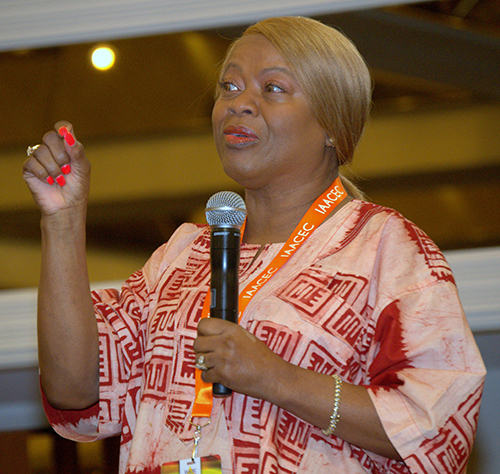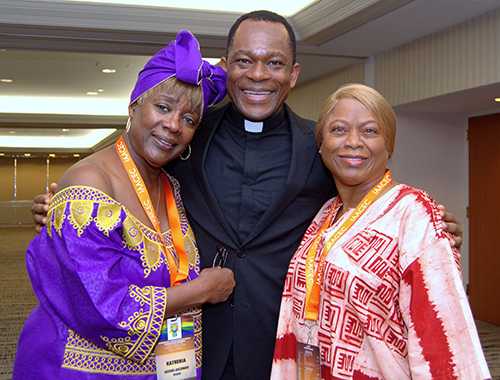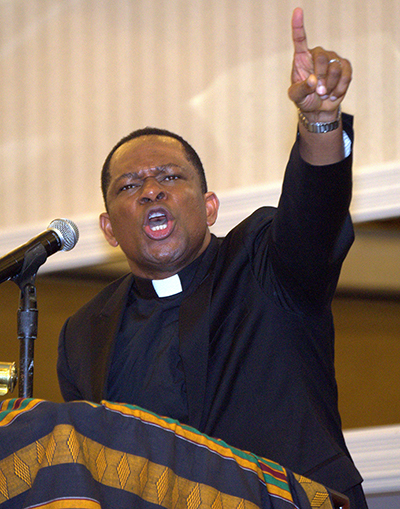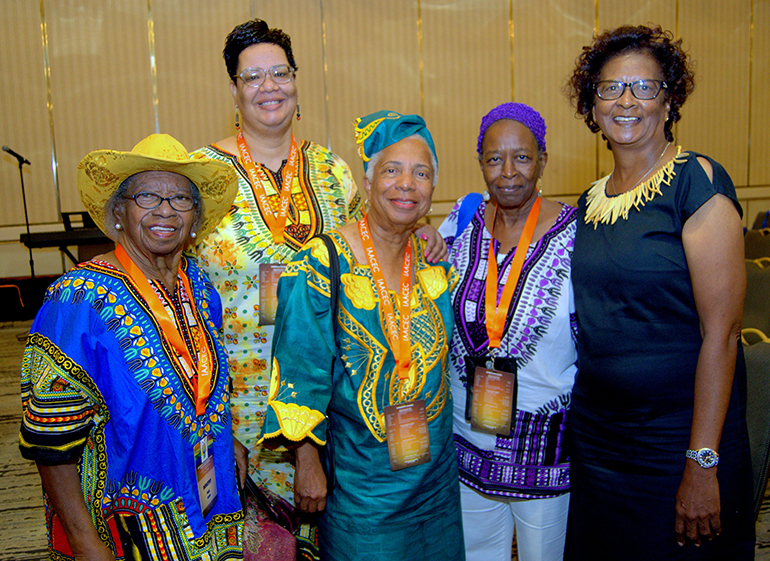By Jim Davis - Florida Catholic
Photography: JIM DAVIS | FC
MIAMI | M. Annette Mandley-Turner birthed a series of black Catholic conferences a quarter-century ago. But in a real way, the grandfather was Pope John Paul II.
That’s how she recalled the genesis of the Interregional African American Catholic Evangelization Conference, which met in Miami Aug. 10-12.
“The Church needs you to enliven it, to share your blackness and your gifts,” she heard from the pope during his U.S. tour in 1987. “And you need the Church.”
Her reaction: “I was captivated. I felt I had to do something. I felt called.”
That calling has grown into the biennial evangelization conference. Visiting South Florida for the first time, it showed off the blend of African culture, vigorous worship and traditional Church spirituality that marks black Catholicism.
The 240 attendees represented 11 dioceses from around the country. Large groups came from Cleveland and Louisville. Groups came from several parishes around the Archdiocese of Miami as well.

Photographer: JIM DAVIS | FC
M. Annette Mandley-Turner, founder of the Interregional African American Catholic Evangelization Conference, speaks during its recent conference in Miami. More than 200 attendees, representing 11 dioceses from around the country, took part in the conference, which met in Miami for the first time, Aug. 10-12.
Just the togetherness � “being with hundreds of black Catholics in one room for one purpose” � was enough for LaQuisha Andrew, of the Diocese of Cleveland, attending her third biennial conference. Like others there, said she enjoyed her distinctiveness as a black Catholic.
“I stand out � I’m different from the rest,” she said. “We have our own traditions and culture.”
Cultural markers abounded in and out of the formal meetings. A small marketplace sold Kwanzaa cards, black Catholic prayer service books, and images of the dark-skinned St. Martin de Porres and Our Lady of Regla. Most of those at the Saturday sessions came in eye-catching kente and batik garb.
GOSPEL AND ‘KYRIE’
Worship services often incorporated African drumming and liturgical movement. Music included gospel standards like “Let the Church Say Amen” and “The Lord is Blessing Me Right Now,” along with familiar Mass responses in Greek and Latin, like “Kyrie” and “Agnus Dei.”
Preaching, too, was African American style. In his keynote speech, Father Maurice Emelu joked, shouted, whispered and made sweeping gestures as he urged his listeners to use their gifts for ministry.
“Whether you are appreciated or not, do good anyway,” the Nigerian priest said, to calls of “God bless” and “Come on now” from the congregation. “To do good is the best way to combat evil.
“You have a treasure given by God in you,” he continued. “You have so much to give to society. Do the little things with love, and they will become wealth in the community.”
Sown among the praise and worship were 25 breakout workshops. Topics including apologetics, children’s ministry, liturgical movement, the need for worship, and the future of blacks in the Church.
Tristan Evans of the Raleigh Diocese, who proclaimed the first reading for the Saturday morning liturgy, said his favorite was the session on “Apologetics When You Feel Like Apologizing.”
“I think Catholics think of confirmation as graduation; they go to a job or college or the military, but they don’t develop in the faith,” said Evans, who works with the African American ministry in his diocese. “They don’t tap into the wealth of knowledge in the Church.”
Dorice Firmin, 30, said she’s been coming to the conferences since her parents brought her at the age of 10. As an adult, she values the knowledge she can bring back to her church in the Archdiocese of Louisville, where she has served as a singer, youth minister, dance coordinator and chair of formation ministry.
YOUTHFUL TREND
This conference, she had a sense of destiny, she said. At first, it looked like lack of money was going to keep her away, but then she found her brother was going to drive to Miami. She saved more by staying with family in town.

Photographer: JIM DAVIS | FC
Katrenia Reeves-Jackman, left, poses with Father Maurice Emelu and M. Annette Mandley-Turner, founder of the Interregional African American Catholic Evangelization Conference. Reeves-Jackman directs the Office of Black Catholic Ministry for the Archdiocese of Miami.
“I believe I was supposed to be here,” Firmin said. “Everything happens for a reason.”
About a quarter of those at the conference were 19 to 35 years old, Mandley-Turner said. Among them was Dave McFarlane, 21, from St. Helen Church in Lauderdale Lakes.
“I like seeing everyone come together as one, and to see their diversity,” McFarlane said. “There are a lot of great-minded people here, and I want to pick their brains and see their outlook on society.”
Drawing from three strands � African roots, Catholic religion and American citizenship � black Catholics have a unique contribution to make, conference goers and organizers alike said.
“Blacks bring a spirituality that’s different from any other,” said Mandley-Turner. “They have a style of worship that invigorates. They bring a commitment to prayer more than other Catholics. And it was blacks who built the early churches, in Virginia and elsewhere. If they can’t be home there, where can they be?”
The Miami conference came by invitation of the archdiocesan Office of Black Catholic Ministry.
“We needed to have one in our own backyard,” said Katrenia Reeves-Jackman, director of the office. “It will help our people to learn and grow in their faith. And it will give them the knowledge and tools to serve in our culture and our city.”
The biennial conferences grew out of a series of conferences sponsored by Mandley-Turner’s multicultural ministry office in the Archdiocese of Louisville. Called “The Roots of It All,” the Louisville conferences drew people from a range of states � including Florida, California, New York, Colorado and Nebraska.
After six years of meetings, the organization went interregional in 1993. “I realized that I don’t own this,” Mandley-Turner said.
Since then, the conferences have been held in cities like Atlanta, Indianapolis, Columbus, Cleveland and Memphis.
SHADES OF BEAUTY
The very presence of blacks in Catholic pews shows the broad appeal of the Church, in the view of Lester and Emmanuella Kelly of Visitation Church, Miami.

Photographer: JIM DAVIS | FC
Father Maurice Emelu, a priest of the Diocese of Orlu in Nigeria, speaks during the Interregional African American Catholic Evangelization Conference in Miami.
Lester said he’s occasionally asked why the Church even needs a separate black presence. His answer: “Sometimes you need a platform to give you a voice. If there’s only one culture, it can marginalize others.”
Haiti-born Emmanuella said it’s more normal to see black Catholics in the Caribbean than in the U.S. But, she added: “The many shades is what makes us beautiful. We’re universal in the truest form.”
Elaborate as it was, the conference ran on a lean $85,000, according to Mandley-Turner. She said the guest speakers got only airfare and hotel rooms. And the eight conference organizers totally paid their own way. “It’s our stewardship,” she said.
She added that black Catholic ministries often suffer from limited funding at the diocesan level, which limits programs like educational outreaches. That in turn is caused at least partly by reduced visibility.
The United States Conference of Catholic Bishops counts three million self-identified blacks among America’s 71.1 million Catholics. But Mandley-Turner said that doesn’t include black Latinos, immigrants from African nations like Ghana, or biracial people born of blacks and other groups.
All told, she guessed that the true number should be more seven million to eight million black Catholics in the U.S.
Still, some conference goers said they’ve seen changes. Michael Taylor, of St. Philip Neri Parish in Miami Gardens, believed there’s more appreciation for the contributions of black Catholics.
“My experience in the Catholic Church was genuflecting and having a white priest,” said Taylor, who sings in the choir and is a Knight of St. Peter Claver. “That’s changed. There are more priests of African descent. And the music is changing. There’s more gospel.
“The contribution wasn’t just needed, it’s always been there,” Taylor said. “It just wasn’t promoted as it is today.”
Even amid the frenzy of conferences, Mandley-Turner has her eyes on the horizon. She said dioceses in western states have already extended invitations to hold conferences there.
But her ultimate dream is for the conference-goers to expand black ministries in their own parishes and dioceses, especially evangelization.
“People need to go home and implement,” she said. “You can’t be a professional conference-goer.”

Photographer: JIM DAVIS | FC
Attendees from the Archdiocese of Miami pose for a photo at the Interregional African American Catholic Evangelization Conference. From left are Dorothy Paul, Tamara Hospedales, Wilhelmina King, Donna Blyden and Virginia Cox.












